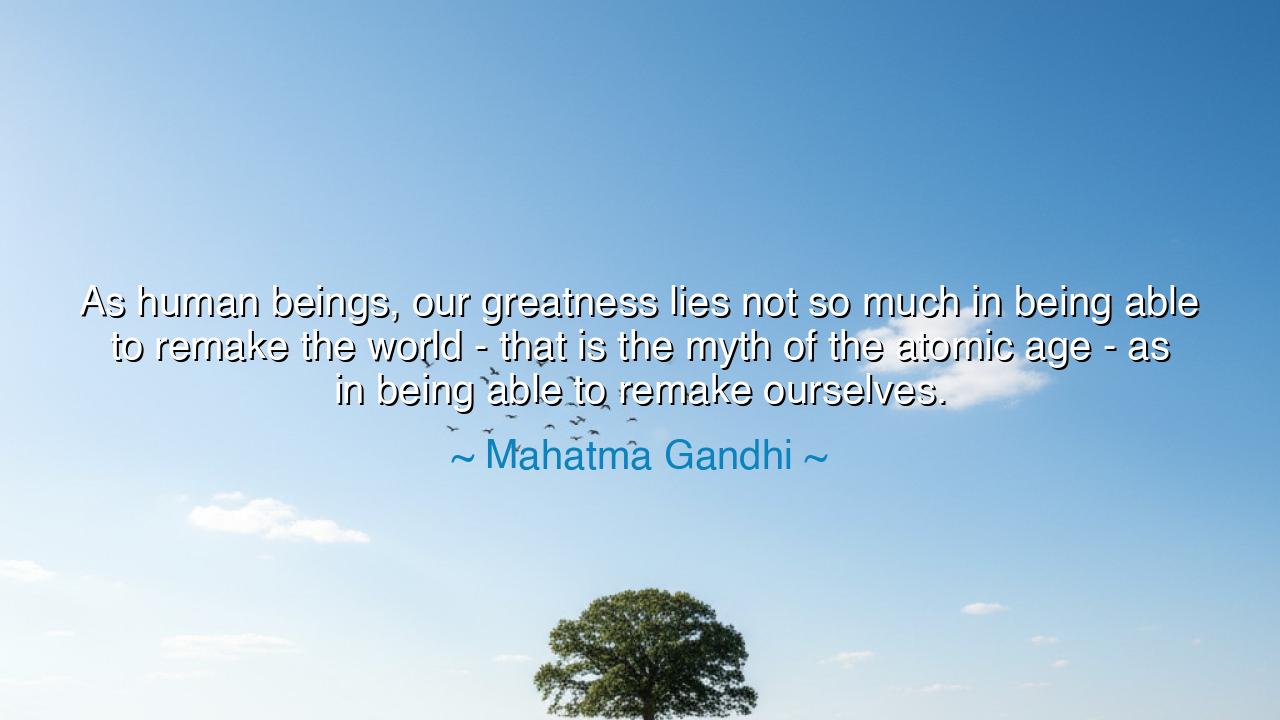
As human beings, our greatness lies not so much in being able to
As human beings, our greatness lies not so much in being able to remake the world - that is the myth of the atomic age - as in being able to remake ourselves.






Harken, O children of the future, to the profound words of Mahatma Gandhi, a man whose spirit transcended the boundaries of time and whose teachings resonate with eternal wisdom: "As human beings, our greatness lies not so much in being able to remake the world—that is the myth of the atomic age—but in being able to remake ourselves." In these words, Gandhi speaks to the very heart of human potential, not as a force to reshape the external world with brute power or technology, but as an internal force to shape and transform the deepest part of ourselves. For it is not the world that needs remaking, but humanity itself.
In the ancient world, the sages and prophets often spoke not of changing the world, but of transforming the self. The great Socrates, in his wisdom, taught that the only true knowledge is the knowledge of oneself, for only by understanding the soul could one achieve true virtue and harmony with the world. The Buddha too, spoke of the path to enlightenment not as a pursuit of external power, but as an inner journey, where the mind is mastered, and the spirit is purified. Both of these teachings reveal a universal truth that Gandhi affirms—that the greatness of human beings does not lie in external domination over the world, but in the ability to control and transform the self.
Consider the story of Alexander the Great, a man who sought to conquer vast lands, to remake the physical world in his image. In his early years, Alexander's ambition was unbounded, and he sought to shape the world with the sword and the mind. He conquered lands from Greece to India, and his empire seemed limitless. Yet, despite his material conquests, Alexander faced the ultimate truth: no matter how many cities he built or armies he commanded, he could not conquer the inner self. His later years were marked by a deep emptiness, as his mind and spirit were consumed by the very forces he had tried to control. In the end, Alexander’s greatness was not in the worlds he conquered, but in his failure to achieve mastery over his own mind and soul. The lesson here is clear: even the most powerful conquests pale in comparison to the victory of conquering oneself.
Gandhi, in contrast, lived his life not seeking to change the world through force, but through self-purification and inner strength. He sought to remold his own character, to live by the highest principles of truth, non-violence, and self-discipline. His greatness lay in his ability to transform his own life and mind, and through this personal transformation, he became the architect of a national movement for independence. Gandhi knew that by changing himself, he could lead others to change. His ability to remake himself, his commitment to self-realization, and his inner peace became the source of his power, not in commanding armies or reshaping the world, but in inspiring the hearts of millions to act with courage and integrity.
In this, O children, lies the true lesson: the world is vast and ever-changing, but it is within the power of each of us to reshape the most important force in existence—ourselves. Gandhi’s message calls us to focus not on controlling the world, which is often a futile and destructive pursuit, but on remaking our hearts, our minds, and our actions. The external world, for all its chaos and conflict, is shaped by those who have mastered the art of self-discipline and self-reflection. Real greatness does not come from what we achieve in the world, but from who we become in the process.
Let us reflect, therefore, upon the story of Nelson Mandela, a man whose greatness did not lie in his ability to wield power, but in his ability to transform his spirit. After spending 27 years in prison, Mandela emerged not with a heart full of hatred, but with a heart ready to forgive and to unite. His ability to remake himself in the face of injustice, to lead with humility and wisdom, became the foundation for the peaceful transformation of a nation. Mandela’s inner strength and his focus on changing himself first—rather than attempting to reshape the world with force—show us the true meaning of Gandhi’s words.
Therefore, O children of the future, take these words to heart. You need not seek to conquer the world or reshape it in your image. Instead, seek to remake yourself—your thoughts, your actions, your values. Let your greatness come not from the external world you dominate, but from the inner world you have the power to transform. As you strive for personal growth, seek not only to change the world around you but to refine the character within you. The world may change, but the true victory lies in mastering the self, for it is only in this personal transformation that you can create lasting peace and goodness in the world.






AAdministratorAdministrator
Welcome, honored guests. Please leave a comment, we will respond soon